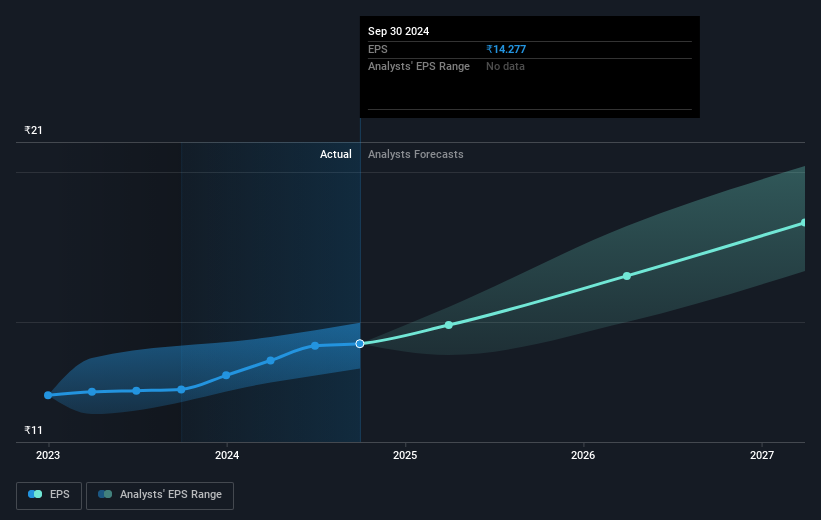City Union Bank's (NSE:CUB) 8.2% CAGR outpaced the company's earnings growth over the same three-year period

Buying a low-cost index fund will get you the average market return. But if you invest in individual stocks, some are likely to underperform. For example, the City Union Bank Limited (NSE:CUB) share price return of 24% over three years lags the market return in the same period. Having said that, the 22% increase over the past year is good to see.
The past week has proven to be lucrative for City Union Bank investors, so let's see if fundamentals drove the company's three-year performance.
See our latest analysis for City Union Bank
In his essay The Superinvestors of Graham-and-Doddsville Warren Buffett described how share prices do not always rationally reflect the value of a business. By comparing earnings per share (EPS) and share price changes over time, we can get a feel for how investor attitudes to a company have morphed over time.
During three years of share price growth, City Union Bank achieved compound earnings per share growth of 18% per year. The average annual share price increase of 7% is actually lower than the EPS growth. So one could reasonably conclude that the market has cooled on the stock.
The company's earnings per share (over time) is depicted in the image below (click to see the exact numbers).

We know that City Union Bank has improved its bottom line lately, but is it going to grow revenue? If you're interested, you could check this free report showing consensus revenue forecasts.
What About Dividends?
When looking at investment returns, it is important to consider the difference between total shareholder return (TSR) and share price return. The TSR incorporates the value of any spin-offs or discounted capital raisings, along with any dividends, based on the assumption that the dividends are reinvested. So for companies that pay a generous dividend, the TSR is often a lot higher than the share price return. As it happens, City Union Bank's TSR for the last 3 years was 27%, which exceeds the share price return mentioned earlier. The dividends paid by the company have thusly boosted the total shareholder return.
A Different Perspective
City Union Bank shareholders are up 23% for the year (even including dividends). But that return falls short of the market. But at least that's still a gain! Over five years the TSR has been a reduction of 3% per year, over five years. So this might be a sign the business has turned its fortunes around. It's always interesting to track share price performance over the longer term. But to understand City Union Bank better, we need to consider many other factors. To that end, you should be aware of the 1 warning sign we've spotted with City Union Bank .
If you are like me, then you will not want to miss this free list of undervalued small caps that insiders are buying.
Please note, the market returns quoted in this article reflect the market weighted average returns of stocks that currently trade on Indian exchanges.
New: AI Stock Screener & Alerts
Our new AI Stock Screener scans the market every day to uncover opportunities.
• Dividend Powerhouses (3%+ Yield)
• Undervalued Small Caps with Insider Buying
• High growth Tech and AI Companies
Or build your own from over 50 metrics.
Have feedback on this article? Concerned about the content? Get in touch with us directly. Alternatively, email editorial-team (at) simplywallst.com.
This article by Simply Wall St is general in nature. We provide commentary based on historical data and analyst forecasts only using an unbiased methodology and our articles are not intended to be financial advice. It does not constitute a recommendation to buy or sell any stock, and does not take account of your objectives, or your financial situation. We aim to bring you long-term focused analysis driven by fundamental data. Note that our analysis may not factor in the latest price-sensitive company announcements or qualitative material. Simply Wall St has no position in any stocks mentioned.
About NSEI:CUB
City Union Bank
Engages in the provision of various banking products and services to personal and corporate clients in India.
Adequate balance sheet average dividend payer.


